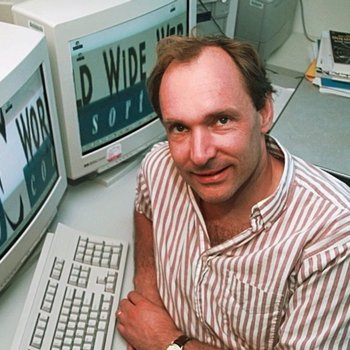DOCTOR OF SCIENCE (HONORIS CAUSA)
 Thanks to Tim Berners-Lee's invention, billions of people across the globe can share and exchange information in the form of text, sounds and images - in short, communicate - at the click of a button. He is the creator of the World Wide Web, the global hypertext system that transformed the bare infrastructure of the Internet into the incredibly rich and diverse mine of information that it is today.
Thanks to Tim Berners-Lee's invention, billions of people across the globe can share and exchange information in the form of text, sounds and images - in short, communicate - at the click of a button. He is the creator of the World Wide Web, the global hypertext system that transformed the bare infrastructure of the Internet into the incredibly rich and diverse mine of information that it is today.
Explaining the difference between the Internet and the World Wide Web, he has said: "The Internet is a network of networks. The Web is an abstract (imaginary) space of information. On the 'Net, you find computers - on the Web, you find documents, sounds, videos,.... information. On the 'Net, the connections are cables between computers; on the Web, connections are hypertext links. The Web made the 'Net useful because people are really interested in information (not to mention knowledge and wisdom!) and don't really want to know about computers and cables."
He is insistent that the Web remain open, non-proprietary and free; and so far, most of the wealth and fame emanating from the Internet and the Web have gone to others. Berners-Lee keeps a low media profile, drives an aging car and runs the WWW Consortium from a small office at the Massachusetts Institute of Technology (MIT).
Tim Berners-Lee was born in London on 8 June 1955. As a child he made pretend computers out of cardboard boxes and fell in love with electronics. Later, at Oxford, he built his own working electronic computer out of spare parts and a TV set. He also studied physics, which he thought would be a good compromise between maths and electronics.
The idea that was to grow into the WWW was born in 1980 while working at CERN, the European Particle Physics Laboratory in Geneva. He wanted a way to organise notes and documents, and had always been interested in programs that dealt with information in a "brain-like way". He devised a piece of software that could, as he put it, keep "track of all the random associations one comes across in real life and brains are supposed to be so good at remembering but sometimes mine wouldn't".
With the program, words in a document could be "linked" to other files on his computer and he could follow the links by number. Then came the idea of adding information that resided on other computers, and of making material available on his system to others. To make it all happen, he created HTML (HyperText Mark-up Language), the lingua franca of the Web; an addressing scheme that gave each Web page a unique location or URL (universal resource locator); and a set of rules that allowed these documents to be linked together on computers across the Internet. He called that set of rules HTTP (HyperText Transfer Protocol). He wrote the first WWW server and the first client browser/editor.
The Web debuted in 1991, bringing order and clarity to the chaos of cyberspace. From then on, the Web and the Internet grew rapidly - within five years, the number of Internet users jumped from 600 000 to 40 million. By 1999, there were 150 million users.
Berners-Lee joined MIT in 1994 to become director of the WWW Consortium which coordinates Web development worldwide, setting standards and ensuring that the Web remains non-proprietary and open to all, regardless of whose browser or software they use.
On the significance of the Web for education, he has said: "I hope that educators will pool their resources and create a huge supply of online materials. I hope much of this will be available freely to those, especially in developing countries, who may not have access to it any other way. …We will (then) see how essential people, and their wisdom, and their personal interactions, are to the educational process. A university is a lot more than its library."
He is much awarded and honoured: in 1997 he was awarded an OBE and in 1999 Time magazine dubbed him one of the 100 greatest minds of the century. He has received six honorary degrees from American universities and is a Distinguished Fellow of the British Computer Society, an Honorary Fellow of the Institution of Electrical Engineers and a Fellow of the Royal Society.
The University of Port Elizabeth is proud to be the first university outside the USA to award an honorary doctorate to Tim Berners-Lee, in recognition of his outstanding contributions to information technology and global communication, revolutionising the way we work, learn, socialise and play.